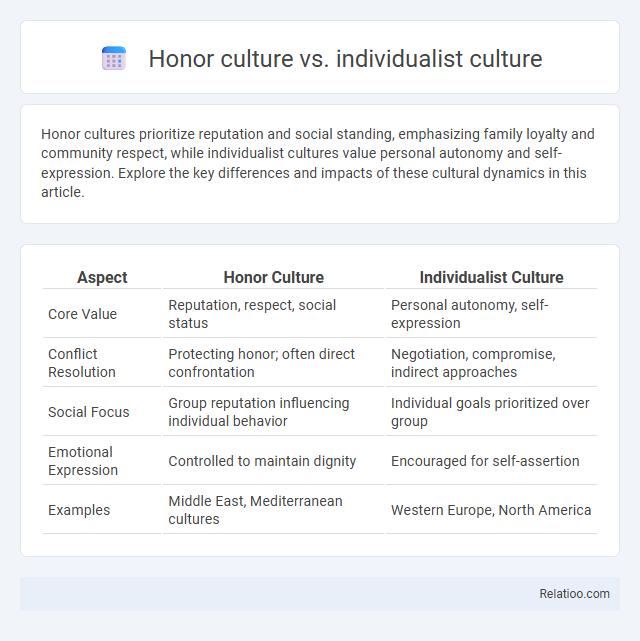Honor cultures prioritize reputation and social standing, emphasizing family loyalty and community respect, while individualist cultures value personal autonomy and self-expression. Explore the key differences and impacts of these cultural dynamics in this article.
Table of Comparison
| Aspect | Honor Culture | Individualist Culture |
|---|---|---|
| Core Value | Reputation, respect, social status | Personal autonomy, self-expression |
| Conflict Resolution | Protecting honor; often direct confrontation | Negotiation, compromise, indirect approaches |
| Social Focus | Group reputation influencing individual behavior | Individual goals prioritized over group |
| Emotional Expression | Controlled to maintain dignity | Encouraged for self-assertion |
| Examples | Middle East, Mediterranean cultures | Western Europe, North America |
Understanding Honor Culture: Key Characteristics
Honor culture emphasizes reputation, social standing, and the importance of defending one's honor through actions and loyalty within a close-knit community. Your behavior in such cultures is guided by the need to maintain respect and avoid shame, often leading to a strong code of personal conduct and reciprocal obligations. Understanding these characteristics helps differentiate honor cultures from individualist cultures, where personal autonomy and self-expression are prioritized over collective reputation.
Defining Individualist Culture: Core Values
Individualist culture emphasizes personal autonomy, self-reliance, and individual achievements as core values, prioritizing personal goals over group objectives. Your identity in this culture is shaped by independent decision-making and the pursuit of individual rights and freedoms. Social relationships are often based on voluntary associations rather than obligations dictated by honor or collective expectations.
Historical Roots of Honor Cultures
Honor cultures have deep historical roots in societies where personal reputation and family honor determined social standing and survival, often emerging in regions with scarce legal infrastructure or prevalent conflicts. Unlike individualist cultures prioritizing personal autonomy and self-expression, honor cultures emphasize collective reputation and retaliation to perceived slights, shaping social norms and behaviors over generations. Your understanding of these historical contexts enhances insight into how honor cultures maintain strict social codes and influence interpersonal relationships today.
Origins and Evolution of Individualist Cultures
Individualist cultures trace their origins to the Enlightenment period in Europe, emphasizing personal freedom, autonomy, and self-expression as core values. These cultures evolved through the rise of capitalist economies and democratic governance, which reinforced the importance of individual rights and personal achievement over collective obligations. The historical shift from agrarian societies to urban and industrial settings further accelerated individualism by fostering social mobility and reducing the influence of extended kinship ties.
Social Relationships: Community vs. Autonomy
Honor cultures emphasize strong social relationships rooted in family loyalty and community reputation, where collective honor governs individual behavior. Individualist cultures prioritize personal autonomy and self-expression, valuing independent decision-making over community expectations. In contrast, dignity cultures balance respect for individual rights with social order, promoting both personal integrity and communal harmony.
Conflict Resolution: Honor-Based vs. Individual Rights
Honor cultures prioritize maintaining reputation and social standing, often resolving conflicts through direct confrontation or community involvement to restore honor. Individualist cultures focus on personal rights and autonomy, favoring legal systems and negotiation to address disputes while protecting individual interests. Understanding Your cultural context is crucial for effective conflict resolution, as honor-based approaches emphasize collective respect, whereas individualist strategies prioritize personal justice.
Gender Roles in Honor and Individualist Societies
Honor cultures often enforce rigid gender roles where masculinity is linked to family protection and female chastity, while individualist cultures exhibit more fluid and egalitarian gender norms based on personal autonomy. In honor societies, male honor is tied to controlling female behavior to maintain social reputation, contrasting with individualist societies that emphasize gender equality and self-expression. Research shows these cultural differences impact social dynamics, with honor cultures promoting collective responsibility and individualist cultures fostering individual rights.
Reputation, Shame, and Personal Achievement
Honor cultures prioritize reputation and social standing, with shame acting as a powerful social control mechanism to maintain family or community honor. Individualist cultures emphasize personal achievement and self-expression, viewing reputation as a reflection of individual success rather than group identity. In your interactions, understanding the impact of shame and reputation in different cultural contexts can help navigate social expectations and personal goals effectively.
Honor Culture and Legal Systems
Honor cultures emphasize maintaining personal and family reputation through social norms and retribution, often relying on informal justice mechanisms outside formal legal systems. Legal systems in honor cultures may exhibit leniency toward acts committed to defend honor, reflecting societal values over codified law. This contrasts with individualist cultures, where legal systems prioritize individual rights and formal justice procedures over communal or familial reputations.
Globalization and Shifting Cultural Paradigms
Globalization accelerates the interaction between honor culture, individualist culture, and collectivist culture, prompting shifts in social norms and values across societies. Honor cultures, characterized by reputation and social standing, often clash with individualist cultures that emphasize personal autonomy and self-expression, resulting in dynamic cultural exchanges and adaptations. These shifting paradigms challenge traditional frameworks, fostering hybrid identities and novel cultural practices in an interconnected world.

Infographic: Honor culture vs Individualist culture
 relatioo.com
relatioo.com